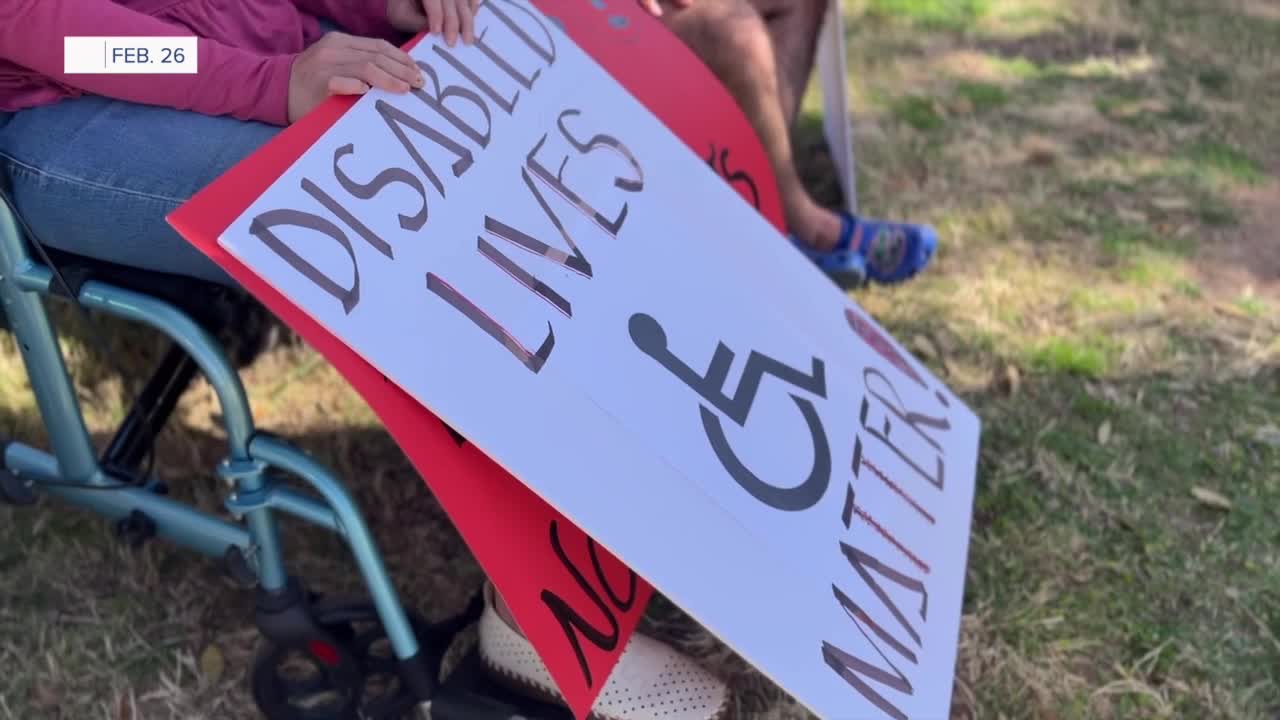PHOENIX — Children with disabilities will see major restrictions to their state services starting next month, cuts advocates say could be catastrophic for families.
The Division of Developmental Disabilities is revamping its policies on attendant care and habilitation services for those younger than 18, changes required by the funding legislation that saved the program running out of money last spring.
“This will cause catastrophic damage to the families that serve our most vulnerable individuals in our state,” said Brandi Coon, a mother who founded the advocacy group Raising Voices Coalition. “And if we're going to make changes, we have to do in a better way.”
Under changes to DDD’s assessment tool, the state will no longer assess the needs of children younger than 10 with disabilities for attendant care, which pays for care workers who help provide safe and healthy living conditions. There are also new, age-based limits on habilitation, or therapies that help those with disabilities gain needed life skills.
That means families now must cover those costs – and parents who were paid for those services as part of a state program will no longer receive that compensation.
“What that will cause is families to go into crisis,” Coon said. “They could be homeless because either they don't have the ability for providers to come in, or they themselves won't be able to work.”
Surge in DDD costs for kids
The cuts come after skyrocketing growth in both attendant care and habilitation for children since the COVID-19 pandemic, according to Department of Economic Security numbers.
The number of children younger than 18 who are authorized for attendant care surged from 1,300 in Fiscal Year 2019 to 11,786 in FY 2025, a hike of 806.6%. Meanwhile, the number of children in DDD overall increased at a far less steep rate: 36.8%.
And spending attendant care for ages 0 to 9 — services cut under DDD's new policies — soared by 3,070% in the same time frame. In FY 2019, DDD spent $5.4 million on attendant care for those ages, compared to $172.6 million in FY 2025.
That outpaces the growth for children of all ages; attendant care spending among children of all ages increased by 1,762.7% in that time period.
Habilitation for children has also climbed, with the number of children authorized to receive services increasing by 127.9%. Hourly spending for children under 18 rose by 390%, from $60.2 million to $295 million.
Rollout of new policies criticized
DDD, a part of Arizona’s Department of Economic Security, unveiled the new restrictions to families on Sept. 3. The new policies take effect Oct. 1.
“They had just over three weeks of notice that some of their loved ones who are in these programs could have their services cut between 50% and 60%,” she said.
Michele Thorne, co-founder and CEO of Care 4 the Caregivers, said the state should have handled the rollout better.
“I want to see how this rolls out, and I want to see what the reality is for these families,” she said. “Right now, we're making a lot of guesses, right? We're making, you know, a lot of maybe educated guesses by reading the policy document.”
The agencies took input on the policies over the summer, but many of the major changes that affect families weren’t in the version sent out for public comment, Coon said.
“It didn't have the hard age limitations, and it didn't include time restrictions, and it didn't include much, much stricter guidelines on habilitation,” said Coon, who even served on a committee that worked on the new assessment tool.
Thorne said that the lack of transparency means families don’t have enough time to adjust.
“Families need to have time to either try to find other workers, or need to try to find daycare for their children, or need to find different employment if they were using this as their main job," she said.
Hobbs: DDD needs to be sustainable
In a statement to ABC15 on Tuesday, a spokesperson for Gov. Katie Hobbs said she is committed to protecting health care for vulnerable Arizonans while also ensuring programs that support them are sustainable.
“These changes were made to ensure services remain clinically appropriate for children while protecting the long-term viability of critical programs,” press secretary Liliana Soto said. “We also recognize the need for additional support beyond these assessed services and our office, in collaboration with AHCCCS and DES, is actively exploring solutions to provide connections for families navigating these transitions.”
On Monday, Hobbs had told reporters the changes only affected families in the Parents as Paid Caregivers Program, which trains and pays parents for care. The legislation that fully funded DDD for the end of the last fiscal year required guardrails on the program, but DDD said in its presentation to families that “policies must be consistent for all minors” under the care of parents or guardians, whether or not they used PPCP.
Arizona must move DDD forward in a fiscally sustainable way, Hobbs said Monday.
“We're making sure that we're protecting this program into the future for the families that need it,” she said.
Thorne agrees DDD needs guardrails, saying no one wants a repeat of this year’s bitter funding battle at the state Capitol.
“I think that we have to try to be pragmatic, right?” she said. “We have to try to save this program.”






